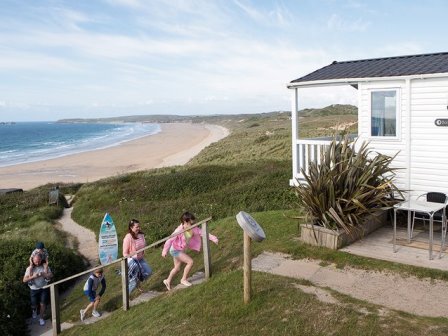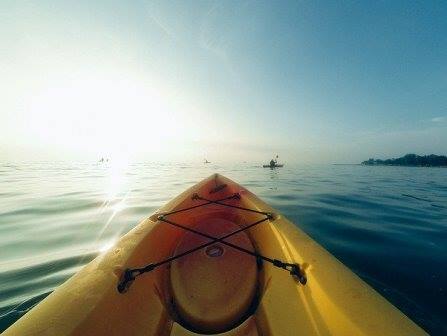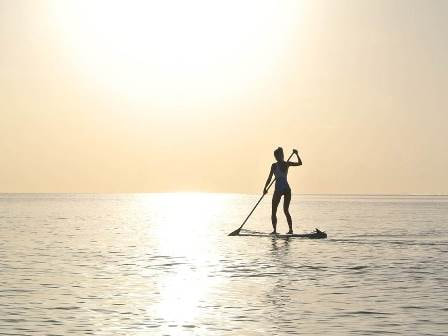This site uses cookies - see our privacy policy. Ads & links in bold may give us a small payment from the seller, at no cost to the buyer. However, this never affects our views - if we like it, we recommend it.
Caravan Holiday Home Ownership - What Does It Cost With Haven, Parkdean or Away Resorts?
|
Owning a lodge or a holiday home on a caravan holiday park owned by the likes of Haven, Parkdean Resorts or Away Resorts is an appealing idea.
You get to use the caravan as a second home as well as the onsite facilities such as the swimming pools and restaurants. You’ll suddenly become more popular with friends who will want to use it. But what does it really cost? And how much can you make from renting it out or subletting? |
Don't miss out! Join our mailing list for holiday park deals and discounts! |
What you need to budget for when you buy a caravan holiday home at Haven, Parkdean etc.
You’ve probably seen adverts at holiday parks for caravans from as little as £20,000 or thereabouts.
However, the headline figure doesn’t tell you everything you need to know.
There are other things you need to budget for:
However, the headline figure doesn’t tell you everything you need to know.
There are other things you need to budget for:
1) Pitch fees - £2500 to £10,000+ per year
When you buy a caravan with Haven, Parkdean etc you pay ‘pitch fees’. This is the biggest annual expense for you and it’s really where the seller makes their money.
It’s a bit like buying a flat and paying a service charge to maintain a communal garden and a lift.
Of course, a Haven or Parkdean holiday park has a huge number of communal facilities so you contribute a lot more.
Here’s what some of the big names say they’ll charge for pitch fees, as of 2021:
It’s a bit like buying a flat and paying a service charge to maintain a communal garden and a lift.
Of course, a Haven or Parkdean holiday park has a huge number of communal facilities so you contribute a lot more.
Here’s what some of the big names say they’ll charge for pitch fees, as of 2021:
- Shorefield say that site fees “start from £4,125”
- Parkdean Resorts say “Our current pitch fees range from £2,600 to £9,294 per year”
- Haven say that “Annual site fees range from £2,945 to £10,000+”
- Away Resorts fees vary but as an example, the 2021 brochure says that the "standard pitch fee" at Sandy Balls is "from £7875"
- Park Holidays pitch fees depend on location. Essex is "from £3,175" whilst Hampshire is "from £6,995"
2) Gas and electricity - £300 - £500 per year
That’s only an approximate figure, but heating and lighting a modestly sized caravan will obviously be cheaper than a large lodge.
3) Insurance - £200 - £500 per year
Again, it depends on what sort of unit you’re buying but larger and more expensive caravans and lodges will be more expensive to insure.
4) ‘Rates’ - £200 - £1500 per year
The good news is that you don’t pay council tax on a holiday home on a Haven, Parkdean, Away Resorts etc site. However, you can’t live in it all year round and you need to have a permanent address elsewhere.
The bad news is that you pay a contribution towards 'rates' instead. This is because the holiday park owners pays business rates and you have to pay your share for the land you are using.
Parkdean Resorts website says that 'Rates, Sewerage and Drainage' could range anywhere between '£340 and £1,500 annually'. Meanwhile, Haven says that 'average rates including water' are £548.
This is a key figure to ask for when you are getting a quote.
The bad news is that you pay a contribution towards 'rates' instead. This is because the holiday park owners pays business rates and you have to pay your share for the land you are using.
Parkdean Resorts website says that 'Rates, Sewerage and Drainage' could range anywhere between '£340 and £1,500 annually'. Meanwhile, Haven says that 'average rates including water' are £548.
This is a key figure to ask for when you are getting a quote.
5) TV and broadband - £500 ish per year
A lot of parks offer Wifi to holiday home owners. You’ll need to find out how much this is. Similarly, you’ll need to budget for a TV licence, streaming services etc.
The amount will obviously depend on whether you want a full-on entertainment package or just a TV licence.
The amount will obviously depend on whether you want a full-on entertainment package or just a TV licence.
6) Depreciation – £2000 - £4000+ per year.
Unlike a house, your static home will be losing value over time rather than gaining it. A static home is more like a car – it offers you something useful for several years rather than being an investment which will gain in value.
Putting a figure on depreciation is difficult but you can get a rough idea by looking at New and Used prices.
On Haven’s caravan selling page, I found that a new three bedroom ABI New Horizon caravan was about £33k.
A three year old model was about £22k so it had depreciated at a rate of about £3600 per year. Meanwhile, a 7 year old ABI Horizon (slightly different model but the same size) was £17k whilst an 8 year old model was £16k. So, the older caravans had depreciated by about £2200 per year over their lifetime.
Much like cars, the depreciation is much worse in the first few years and it is much worse on more expensive models. You might decide to buy a static home which is three or four years old to lessen the depreciation.
Another useful figure is on the Haven ownership guide. Haven suggest that 'your holiday home could lose up to 15% of its value per year' due to depreciation. That means that a £50,000 caravan might lose £7500 in the first year. By the time it is worth £20,000 you might only lose £3000 to depreciation in a year.
Putting a figure on depreciation is difficult but you can get a rough idea by looking at New and Used prices.
On Haven’s caravan selling page, I found that a new three bedroom ABI New Horizon caravan was about £33k.
A three year old model was about £22k so it had depreciated at a rate of about £3600 per year. Meanwhile, a 7 year old ABI Horizon (slightly different model but the same size) was £17k whilst an 8 year old model was £16k. So, the older caravans had depreciated by about £2200 per year over their lifetime.
Much like cars, the depreciation is much worse in the first few years and it is much worse on more expensive models. You might decide to buy a static home which is three or four years old to lessen the depreciation.
Another useful figure is on the Haven ownership guide. Haven suggest that 'your holiday home could lose up to 15% of its value per year' due to depreciation. That means that a £50,000 caravan might lose £7500 in the first year. By the time it is worth £20,000 you might only lose £3000 to depreciation in a year.
What is a caravan holiday home 'licence'?
This is a little complicated, so pay attention at the back.
When you sign up with Haven, Shorefield, Parkdean etc. you are given a ‘licence’. This is how long you are allowed to keep your caravan at the park.
Once this time expires, you still own the actual caravan but you don’t necessarily have the right to keep it there. Your options will be:
One reason for this ‘licence’ is to stop people keeping tatty old caravans on nice modern holiday parks. Haven, Parkdean etc don’t really want a row of 50 year old caravans making their resorts look run-down.
The length of licence varies. When I checked, Haven’s standard licence was 12 years whilst Parkdean Resorts was 20 years.
However, with Haven you can get the licence extended and they say that they 'let you keep your static caravan on our sites for as long as you want' (that's from the ownership guide). They give an example of a caravan which is more than 40 years on one of their sites. If you want to do so, then you'll need to invest in improvements and upgrades to avoid it looking worn out.
When you sign up with Haven, Shorefield, Parkdean etc. you are given a ‘licence’. This is how long you are allowed to keep your caravan at the park.
Once this time expires, you still own the actual caravan but you don’t necessarily have the right to keep it there. Your options will be:
- Get another licence to keep the caravan at the same site
- Buy a new caravan to replace the existing one
- Move your caravan to a different site
One reason for this ‘licence’ is to stop people keeping tatty old caravans on nice modern holiday parks. Haven, Parkdean etc don’t really want a row of 50 year old caravans making their resorts look run-down.
The length of licence varies. When I checked, Haven’s standard licence was 12 years whilst Parkdean Resorts was 20 years.
However, with Haven you can get the licence extended and they say that they 'let you keep your static caravan on our sites for as long as you want' (that's from the ownership guide). They give an example of a caravan which is more than 40 years on one of their sites. If you want to do so, then you'll need to invest in improvements and upgrades to avoid it looking worn out.
Can I sublet my holiday home with Haven, Parkdean Resorts etc?
The way to make back all those site fees and other expenses is to let out your holiday home when you don’t want to use it. It’s also known as subletting.
Some people do this themselves, via a site such as Booking.com or Airbnb.
Another option is to let the holiday park owners manage this for you. Haven and Away Resorts are among the companies which offer a lettings service.
Of course, the companies take a commission for a fully managed service. This gobbles up your earnings but they reckon they can get a higher rental price for you. You also need to pay for cleaning the property and there’s a charge for your visitors to use onsite entertainment.
Some people do this themselves, via a site such as Booking.com or Airbnb.
Another option is to let the holiday park owners manage this for you. Haven and Away Resorts are among the companies which offer a lettings service.
Of course, the companies take a commission for a fully managed service. This gobbles up your earnings but they reckon they can get a higher rental price for you. You also need to pay for cleaning the property and there’s a charge for your visitors to use onsite entertainment.
How much money would I make from subletting a holiday home or caravan?
This is the great unknown when you are buying a holiday home. Is it possible to make a profit or break even whilst also having a holiday home that you can use yourself?
I'm not going to give a definite answer (sorry), but I'll give you some pointers.
A very rough rule of thumb is that a holiday home in the UK will be occupied about 50% of the time. A guide from Schofields insurance suggests 21 weeks a year (40%) whilst this blogger has averaged 61% occupancy for their holiday home. The actual figure will depend on things like the location and overall demand for UK holidays.
Of course, the amount you'll rent the property out for is very variable. A week in August for a two bedroom caravan in Cornwall will probably be more than £1000 (perhaps much more) whilst a weekend in October might be less than £200 (perhaps much less!).
The Covid pandemic has made it harder to predict demand. Travel restrictions led to a huge surge in demand for staycations, including caravan holidays. The question is whether that will lead to a future where a) people continue to holiday in the UK as it's scenic, less hassle and better for the planet or b) people make up for the lost years where they couldn't travel abroad. My hunch is that it will settle down to pre-pandemic levels eventually.
I'm not going to give a definite answer (sorry), but I'll give you some pointers.
A very rough rule of thumb is that a holiday home in the UK will be occupied about 50% of the time. A guide from Schofields insurance suggests 21 weeks a year (40%) whilst this blogger has averaged 61% occupancy for their holiday home. The actual figure will depend on things like the location and overall demand for UK holidays.
Of course, the amount you'll rent the property out for is very variable. A week in August for a two bedroom caravan in Cornwall will probably be more than £1000 (perhaps much more) whilst a weekend in October might be less than £200 (perhaps much less!).
The Covid pandemic has made it harder to predict demand. Travel restrictions led to a huge surge in demand for staycations, including caravan holidays. The question is whether that will lead to a future where a) people continue to holiday in the UK as it's scenic, less hassle and better for the planet or b) people make up for the lost years where they couldn't travel abroad. My hunch is that it will settle down to pre-pandemic levels eventually.
A not-very-accurate calculation for how much you can make from your caravan
Here's my technique for figuring out (very roughly) how much rental income you might get from your holiday home. I'm not promising that it's accurate, but I prefer to have some vague numbers to work with.
First, you'll need to guess how often it will be rented out for.
Let's assume that your caravan will be rented for:
That adds up to 21 weeks, which is the average suggested above. You might get a higher occupancy but you might also end up with some expensive empty weeks in summer. Some holiday parks open in winter, but others close completely. Either way, don't expect a big rental income during that time.
Next, you need to figure out how much you will charge to hire out your caravan. The best way to do this is to look for similar caravans for hire on Haven, Away Resorts or wherever you are planning on pitching your static home. If you're going to rent it out privately, have a look at prices on Airbnb or a similar site.
For argument's sake, I'm going to use these nice round figures:
So, if I achieve my predicted 21 week occupancy, my caravan will earn £15,100.
Of course, these are just rough figures but hopefully they'll give you an idea of how to make a calculation for yourself.
First, you'll need to guess how often it will be rented out for.
Let's assume that your caravan will be rented for:
- four weeks in June, July and August
- three weeks in May
- two weeks in April and September
- one week in March and October
That adds up to 21 weeks, which is the average suggested above. You might get a higher occupancy but you might also end up with some expensive empty weeks in summer. Some holiday parks open in winter, but others close completely. Either way, don't expect a big rental income during that time.
Next, you need to figure out how much you will charge to hire out your caravan. The best way to do this is to look for similar caravans for hire on Haven, Away Resorts or wherever you are planning on pitching your static home. If you're going to rent it out privately, have a look at prices on Airbnb or a similar site.
For argument's sake, I'm going to use these nice round figures:
- March - £300 per week (total of £300 earned based on prediction above)
- April - £500 per week (total of £1000, based on two weeks rental)
- May - £700 per week (total of £2100, based on three weeks rental)
- June and July - £800 per week (total of £6400, based on four weeks rental per month)
- August - £1000 per week (total of £4000, based on four weeks rental)
- September - £500 per week (total of £1000, based on two weeks rental)
- October - £300 per week (total of £300, based on one weeks rental)
So, if I achieve my predicted 21 week occupancy, my caravan will earn £15,100.
Of course, these are just rough figures but hopefully they'll give you an idea of how to make a calculation for yourself.
What about the costs of subletting?
There are several things you'll need to deduct from your £15,100 income.
One significant cost is letting agent fees and cleaning. At the time of writing, Haven's 'Flexi' lettings service charges '15% commission, £35 for cleaning, £10 for welcome services and the VAT'. If we apply those to the example above we'd pay out £2718 in commission, £210 for welcome services and £735 for cleaning.
That's a total of £3663 costs, which leaves us with £11,437.
Of course, we need to deduct the other costs mention earlier. For argument's sake, these could be:
(These are all very rough estimates for the sake of argument - don't blame me if you get charged twice as much!)
Total: £8800 costs. Profit remaining - £2637.
Remember that you also need to deduct any weeks that you'll use the property yourself.
If you want to use the caravan for two weeks in August then you can deduct a couple of thousand pounds from that figure above. Or, you might be more flexible and just use the caravan when it isn't booked out.
One significant cost is letting agent fees and cleaning. At the time of writing, Haven's 'Flexi' lettings service charges '15% commission, £35 for cleaning, £10 for welcome services and the VAT'. If we apply those to the example above we'd pay out £2718 in commission, £210 for welcome services and £735 for cleaning.
That's a total of £3663 costs, which leaves us with £11,437.
Of course, we need to deduct the other costs mention earlier. For argument's sake, these could be:
- Site fees - £4000 (this figure varies a lot, but it's not an unrealistic figure)
- Rates - £500 (again, very variable but this is realistic)
- Gas and electric - £500
- TV and broadband - £500
- Insurance - £300
- Depreciation - £3000 (see the notes above)
(These are all very rough estimates for the sake of argument - don't blame me if you get charged twice as much!)
Total: £8800 costs. Profit remaining - £2637.
Remember that you also need to deduct any weeks that you'll use the property yourself.
If you want to use the caravan for two weeks in August then you can deduct a couple of thousand pounds from that figure above. Or, you might be more flexible and just use the caravan when it isn't booked out.
Conclusion
My three conclusions are:
- A caravan holiday home should not be seen as a financial investment. Several guides from holiday park companies make a comparison to a car, which I think is a good one. You are paying for something that is useful and enjoyable rather than something to pass on to the children.
- It's vital that you know all of the annual fees you are signing up for. These can be pretty significant or they can be quite modest, depending on the holiday park.
- You can cover a lot of the costs of a caravan holiday home by subletting. However, you need to weigh up whether you'd rather use the caravan yourself or cover your costs.



